College of Agriculture & Environmental Sciences
Doing a little bit to save a life before a bite
On Sunday, 27 May 2018, a dedicated team of Unisans from the Department of Agriculture and Animal Health in the College of Agriculture and Environmental Sciences (CAES) and staff members from the Animal Anti-Cruelty League (AACL) spent time with the community in Jackson’s Drift. The AACL is a non-governmental organisation that provides a veterinary welfare service in South Africa through donations, and supports communities.
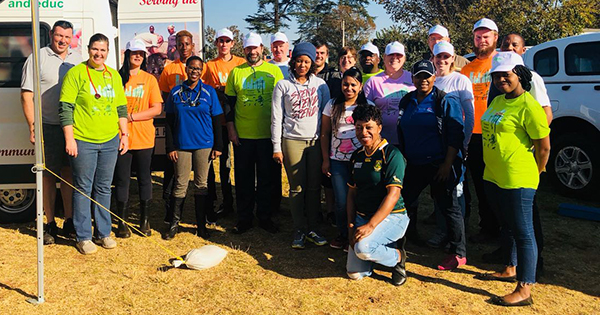
Back Row: Mr R Jackson – AACL Chief Inspector, Mrs C Lee Price – AACL General Manager, Ms N Nel (AACL), Ms S Madodo (AACL), Ms S Alkers (AACL), Mr R Steele (AACL), Dr K Malepe (Unisa), Ms L Venter (AACL), Mr L lesibe (AACL), Mr J SteenKamp (AACL), Mr D Beukes (AACL), Mr E Mahapi (AACL). Middle Row: Mrs Nchabeleng (Unisa), Mr D Beukes (AACL), Ms K C Butler (Unisa student), Ms M Bezuidenhout (AACL), Ms C Ramsey (AACL), Ms P Vicane (AACL), Ms B Ditle (Unisa), Dr PN Kayoka on her knee (Unisa)
The aim of the visit (and similar visits planned for the future) was to make the community aware of Rabies and the importance of vaccinating and taking care of pets. The AACL has established a wonderful network with children aged 8 to 15 years called “Paw rangers”. This network of young animal lovers invited members of their community to bring their pets to be vaccinated and treated by the team from Unisa and the AACL on the day.
According to the World Health Organization, an average of 60 000 people die from Rabies annually. In South Africa, there has been recent cases of human Rabies in the Eastern Cape, Limpopo and KwaZulu-Natal. All these cases were the result of exposure to rabid dog or cat bites. Rabies is a viral, lethal disease that is transmitted to both humans and other mammals via bites and scratches from an infected animal. It mainly causes inflammation of the brain. Once the symptoms of Rabies appear, the infected person or animal rarely survives the disease, even if they are treated. The prevention of Rabies in humans depends on decreasing the disease in the animal kingdom, and the compulsory vaccination of susceptible animals is the best way to prevent the disease from spreading.
In Jackson’s Drift, the team administered different treatments to dogs and cats, including deworming, and vaccinations against Rabies and other viral diseases such as Canine Distemper, Infectious Canine Hepatitis, Respiratory Canine Adenovirus, Canine Parainfluenza and Canine Parvovirus. Cats were vaccinated against Rabies, Feline Viral Rhinotracheitis, Calicivirus and Panleukopenia.
On the day, more than 150 dogs and cats were vaccinated and treated for conditions that included abscesses, ectoparasites (fleas, ticks) and worms. Serious cases were referred to the Veterinary hospital for further treatment.
This partnership between CAES and the AACL is mutually beneficial as it provides an opportunity for staff members to share knowledge and identify research needs, and for students in animal health to gain practical experience while interacting with and tackling the needs of communities. The Department of Agriculture and Animal Health will continue with the project to do its little bit for our communities.
Ms Cindy Price, Dr Faizel Suleyman and their team, represented the AACL while the Unisa team included students and Dr Keleabetswe Malepe, Ms Boitumelo Ditle, Ms Bertha Nchabeleng and Dr Prudence Kayoka (Department of Agriculture and Animal Health, CAES).
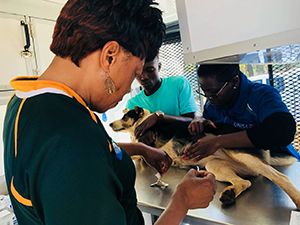
Dr Kayoka (Unisa) removing a suture from a dog few weeks after a spay |
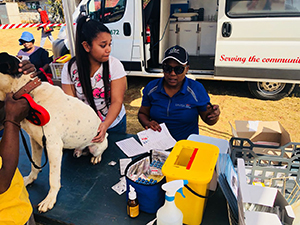
Ms Ditle (Unisa), filling in details of the dog prior to vaccination while Unisa student and owner restraining the dog |
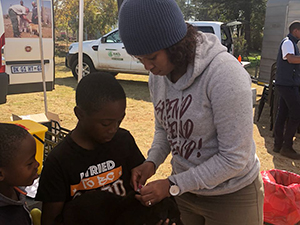
Mrs Nchabeleng (Unisa) checking a dog’s ears for the presence of ticks while the owner’s child is handling it |
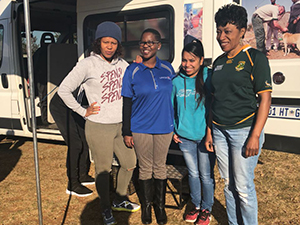
Mrs B Nchabeleng, junior lecturer (Unisa, CAES), Dr K Malepe, senior lecturer (Unisa, CAES), Ms K C Burtle, student (Unisa, CAES) and Dr Kayoka, senior lecturer (Unisa, CAES) |
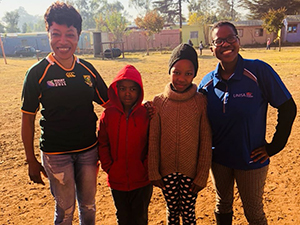
Unisa team with Paw rangers |
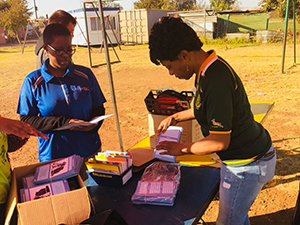
Dr Kayoka filling in a vaccination card with Dr Malepe reading the history of the case |
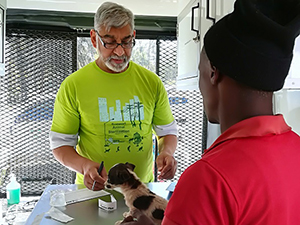
AACL Chief Veterinarian, Dr Faizel Suleyman consulting in the AACL van |
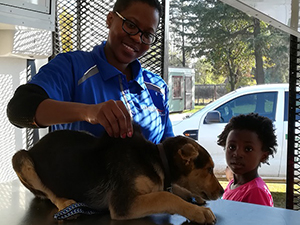
Dr Malepe (Unisa) conducting a clinical examination of the dog while the owner's child observes in the background |
By Prudence Kayoka
Publish date: 2018-06-04 00:00:00.0

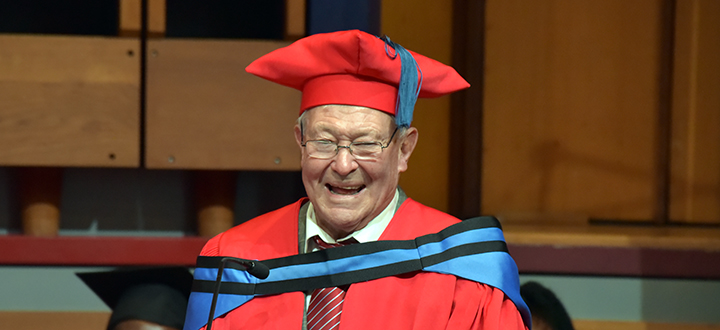 Community champion and agricultural entrepreneur extraordinaire honoured by Unisa
Community champion and agricultural entrepreneur extraordinaire honoured by Unisa
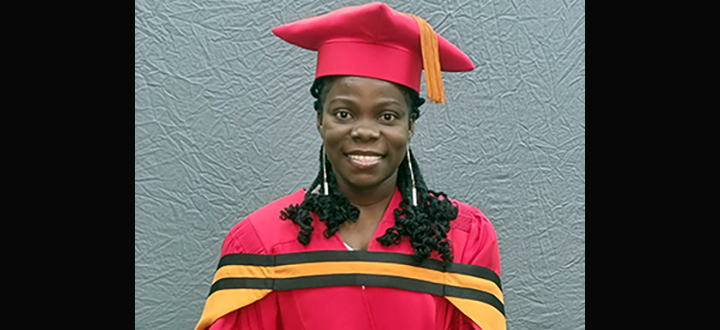 Ghanaian-born Swede earns PhD in Information Sciences from Unisa
Ghanaian-born Swede earns PhD in Information Sciences from Unisa
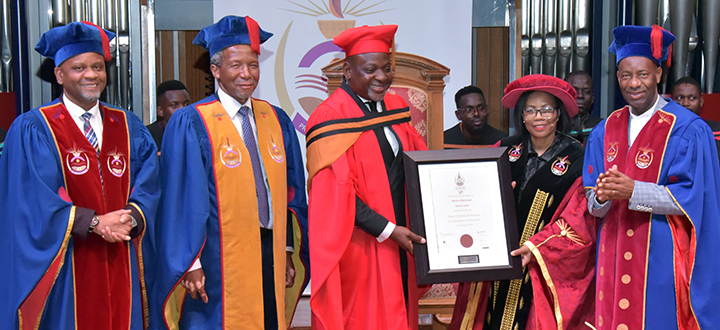 Unisa awards honorary doctorate to exemplary philanthropist and entrepreneur Collen Tshifhiwa Mashawana
Unisa awards honorary doctorate to exemplary philanthropist and entrepreneur Collen Tshifhiwa Mashawana
 Inhlanyelo Hub explores financing and sustainability at the International Conference on Business Incubation
Inhlanyelo Hub explores financing and sustainability at the International Conference on Business Incubation
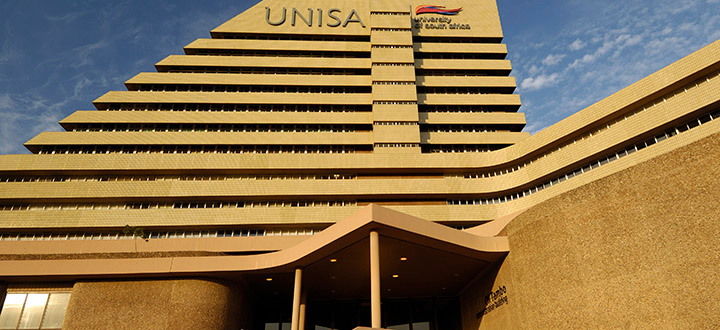 Unisa remains anchored among the waves
Unisa remains anchored among the waves